Atlas Syringe Pump
Our best selling Atlas Syringe Pump is the perfect addition to your lab. Designed to work as standalone syringe pumps with your existing batch reactors or controlled by Syrris’ Atlas HD automated jacketed reactor or Atlas PC Software, they offer a small footprint and are lightweight enough to be easily moved between lab benches.
Don’t miss out on our limited-time offer, get in touch today to receive 15% off your Atlas Syringe Pump!
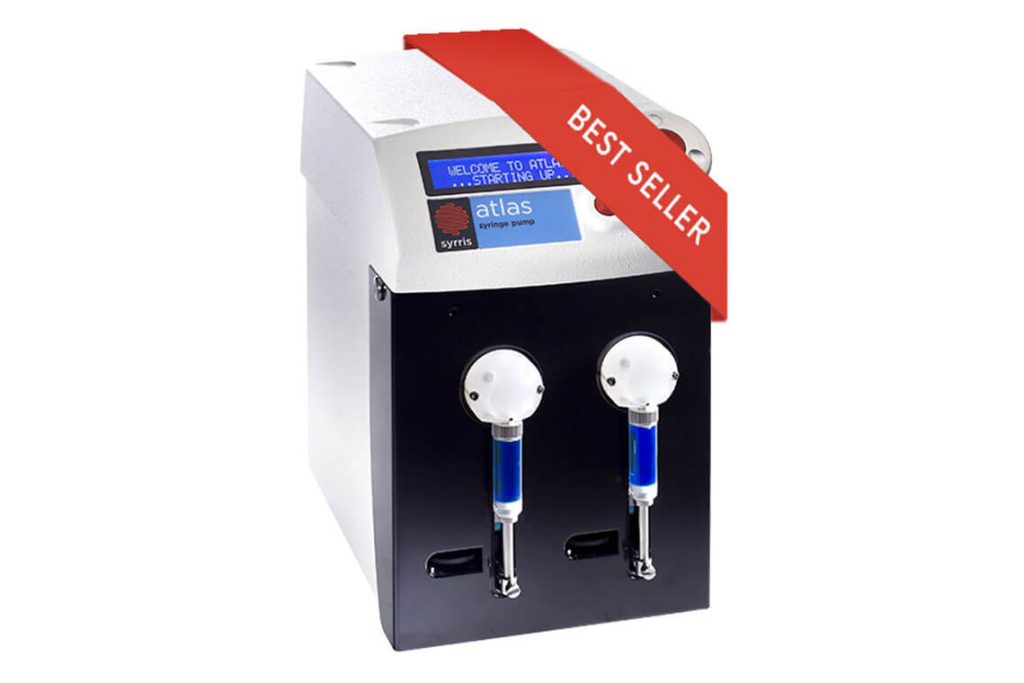
Advanced dosing protocols
Atlas Syringe Pump enables versatile volumetric dosing or sampling and has a wide range of dosing modes; dual, pH control, temperature-dependent, pseudo-gravimetric, and continuous. Advanced dosing protocols eliminate tedious or tricky tasks and free up your time in the laboratory.
-
pH controlled dosing
Combined with an Atlas pH probe and node, Atlas Syringe Pumps can automatically dose an acid and/or base to keep the pH or your reaction within a defined range. Automated pH control can save chemists valuable time by removing the need to manually add small amounts of acid/base over the course of a reaction.
A wealth of chemical and biological transformations exist that show a strong correlation between pH and rate of reaction. Many starting materials, reactive intermediates, and products are sensitive to acids/bases, so accurate pH control is essential for reactions to progress reliably. Automated and precise pH control enables chemists more control over certain chemistries, such as catalytic reactions, bio-reactions, and enzymatic reactions, and enables measurement of reaction kinetics and conversion.
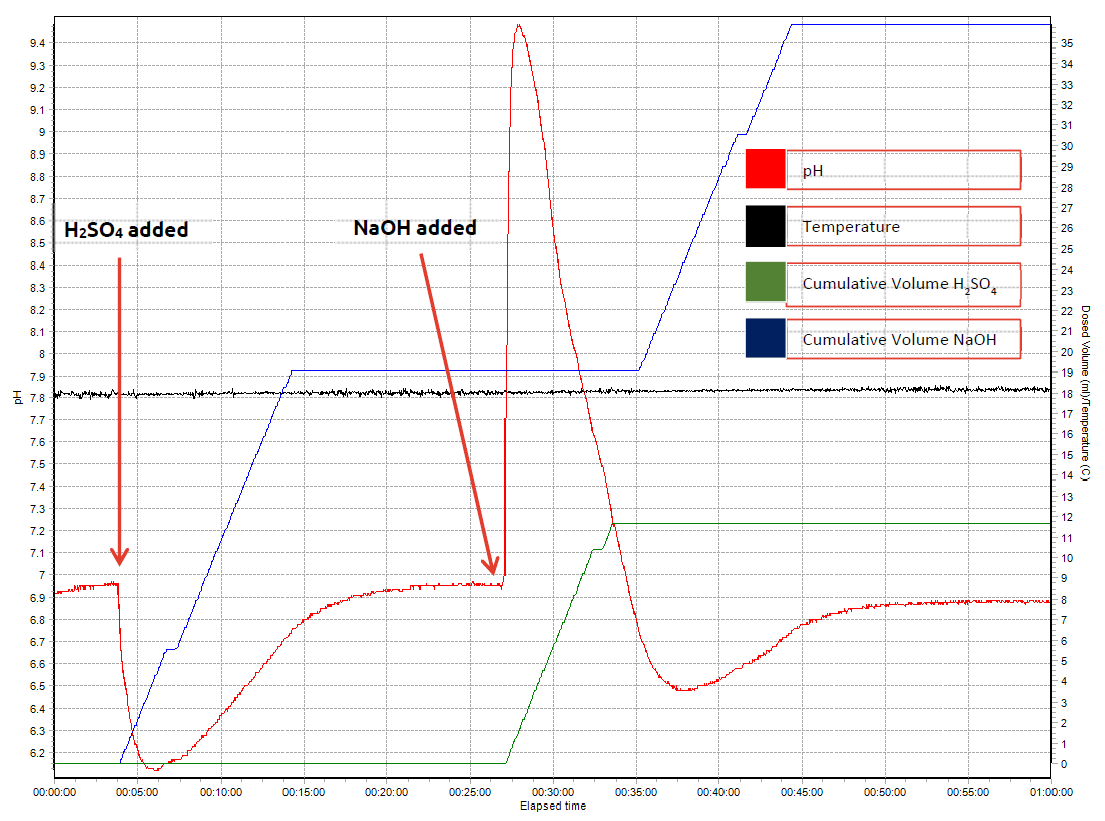 Automated pH controlled dosingA graph showing Atlas Syringe Pump controlling the pH level of an un-buffered solution
Automated pH controlled dosingA graph showing Atlas Syringe Pump controlling the pH level of an un-buffered solution -
Temperature-dependent dosing
Atlas Syringe Pump offers temperature-dependent dosing, allowing you to pause reagent addition until your reactor temperature is within a defined range. Automatically mitigate against exotherms and endotherms, increasing laboratory safety and saving valuable time.
Accurate temperature control and monitoring is vital for accurately predicting the scale-up of chemical processes, and in biochemistry, temperature control is critical to avoiding denaturing or damaging the product.
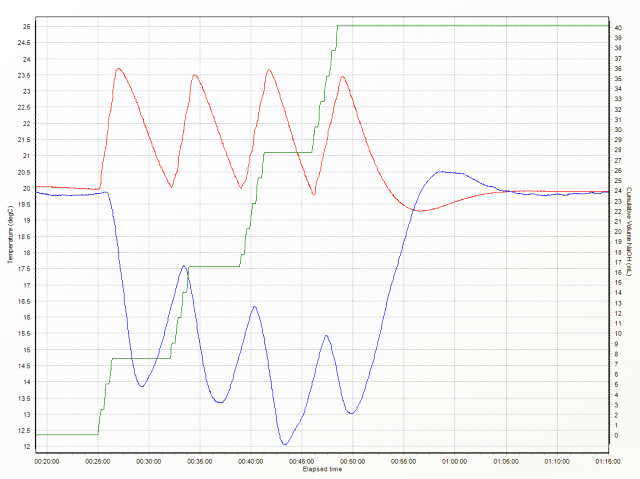 Automated temperature-dependent dosingThe reactor temperature, circulator temperature, and cumulative dosed volume of NaOH (aq) for the temperature-dependent dosing experiment are shown in this graph
Automated temperature-dependent dosingThe reactor temperature, circulator temperature, and cumulative dosed volume of NaOH (aq) for the temperature-dependent dosing experiment are shown in this graph -
Pseudo-gravimetric dosing
Atlas Syringe Pump can perform pseudo-gravimetric dosing, a powerful technique for the accurate introduction of a reagent into a reactor, utilizing a mass balance to ensure that the desired quantity of reagent is dosed. In test experiments, the process gave excellent results with an error in dosing of less than or equal to 0.1% of the required dosed amount.
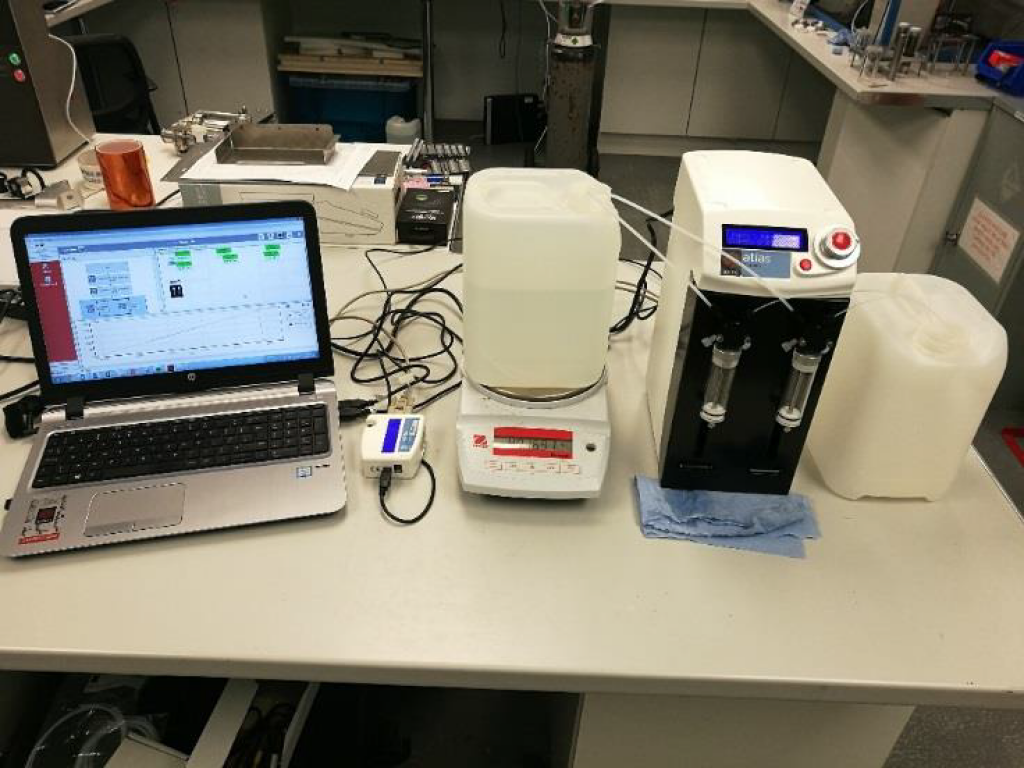 Pseudo-gravimetric dosing set-upA photograph from test experiments demonstrating pseudo-gravimetric dosing using Atlas Syringe Pump paired with Ohaus Pioneer Balance and Atlas Software
Pseudo-gravimetric dosing set-upA photograph from test experiments demonstrating pseudo-gravimetric dosing using Atlas Syringe Pump paired with Ohaus Pioneer Balance and Atlas Software -
Autosampling
Atlas Syringe Pump enables automated sampling of up to 6 samples with each syringe/valve, directly through the syringe pump or through the Atlas PC Software.
Chemists can define a number of variables for complete control, including; the number of samples needed; the volume of each sample; the time it takes to aspirate the sample; the delay before the first sample is taken; and the delay between each sample.
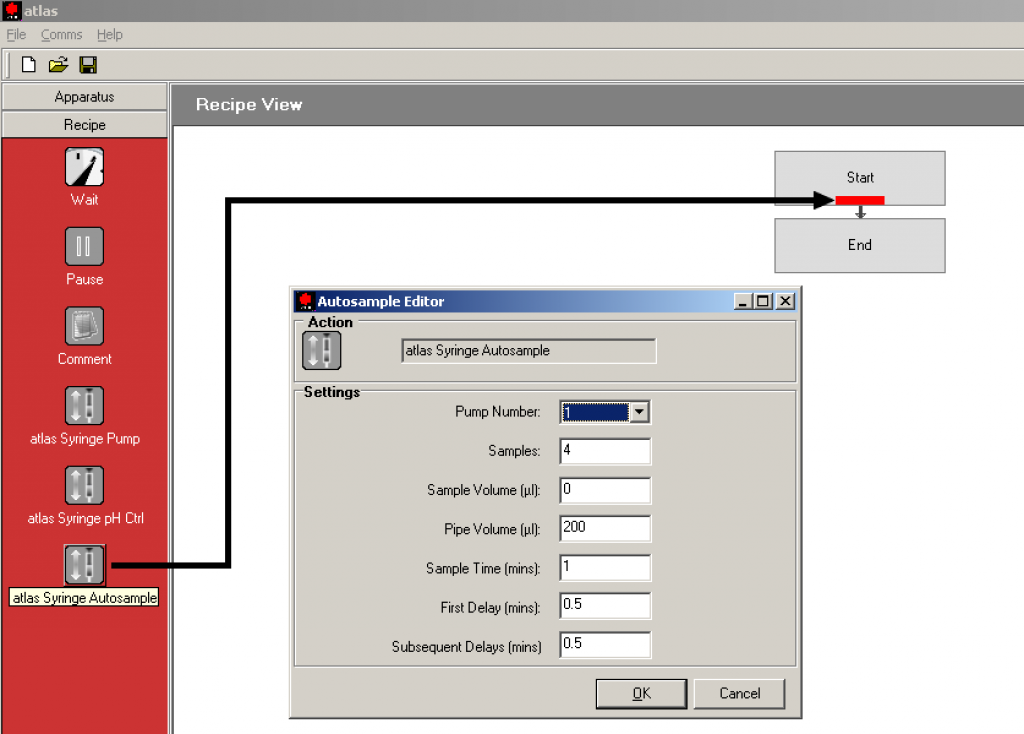 Atlas Syringe Pump autosampling software preview
Atlas Syringe Pump autosampling software preview
For all your chemistry needs
Atlas Syringe Pump offers smooth flow, 6 bar pressure, 2 syringes, 2 valves, up to 6 ports per valve, and all 6 main modes of operation. Multi port valves dose many reagents to the same reactor or multiple reactors and remove the need for manual handing or filling of syringes.
Atlas Syringe Pump offers a flow rate of 0.5 μL/min to 20,000 μL/min (20 mL) and syringe sizes from 50 μL to 5000 μL.
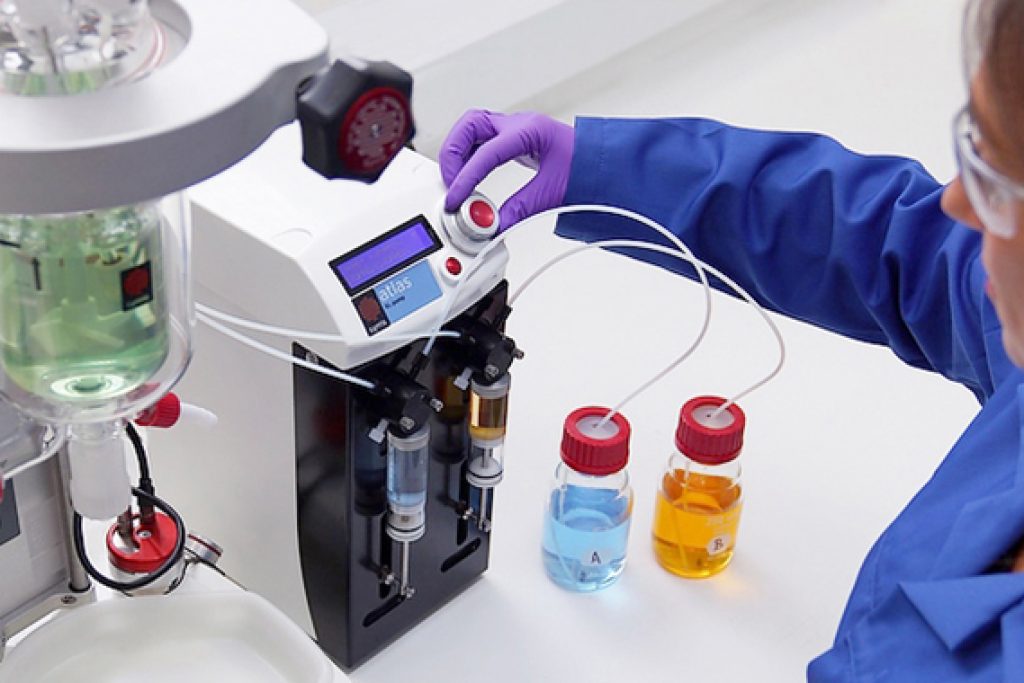
Standalone, PC, or Atlas HD Base control
Atlas Syringe Pumps have been designed to work as standalone syringe pumps, using the click wheel control and screen to select and configure dosing methods.
Atlas Syringe Pumps offer 6 main modes of operation:
-
-
- Dual Dosing Mode allows independent control of each syringe and associated valve, enabling chemists to dose with one syringe and autosample using the other. Available commands include: dose a particular volume; pump at a particular flow rate; dose one reagent to many jacketed reactors; sophisticated profiles; and auto-sampling (connect the Autosampler and probe to enable automated sampling of up to 6 samples with each syringe/valve)
- pH Control Mode can automatically dose an acid and/or base to keep the pH or your reaction within a defined range
- Temperature Control Dosing Mode enables the Atlas Syringe Pump to dose key chemicals based on a set temperature, offering safe dosing into exothermic reactions
- Continuous-Dosing Mode enables 2 syringe pumps to work together to produce 1 continuous flow, i.e. one is refilling while the other is dispensing
- Atlas HD Base Control Mode enables an Atlas HD automated jacketed reactor (or Reactor Master automation unit) to control the Atlas Syringe Pump as part of an automated temperature and stirrer speed profile
- PC Control Mode controls the Atlas Syringe Pump from Atlas PC Software, enabling the pump to be used in complex, multi-step automated reactions
-
Performance and flexibility
Atlas Syringe Pumps can perform dual-dosing, continuous dosing, pH control, and temperature-dependent control in Standalone mode, enabling chemists to move the pump around the lab for use with different reactors.
The valves are user changeable and are available in a number of different port options. Each of the ports on each valve can be configured to be an input or output; with a 6 port valve it is possible to pump from up to 5 sources to one reactor, etc. per syringe. The syringes are also user changeable and come in a variety of sizes, corresponding to a variety of flow rate ranges. Use the Atlas Pump Pressurized Input Store to enable an inert gas blanket over the samples to be pumped and to minimize cavitation/bubbles.
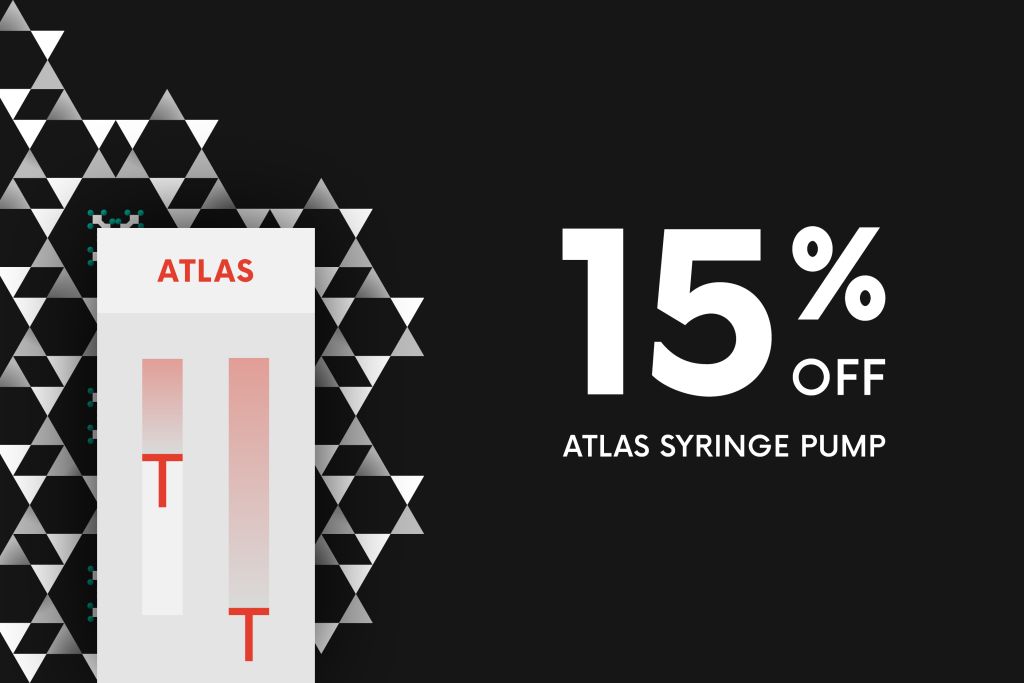
Limited time offer from Syrris
15% off Atlas Syringe Pump offer available until midnight 31st December 2024…
…don’t miss your chance!
-
Terms & conditions
- Offer only valid on orders received before midnight (Pacific Time) 31st December 2024.
- Offer can not be used in conjunction with other offers, discounts or special promotions.
- Shipping costs not included and all other standard Syrris T&C’s apply – please see our website.
- We reserve the right to withdraw, amend or extend this offer at any time without prior notice.
-
Flow rate range for Atlas Syringe Pump
Flow rate range for Atlas Syringe Pump Min flow rate μL/min Max flow rate μL/min Syringe size (μL) Continuous flow Dual dose mode Continuous flow Dual dose mode 50 10 0.5 200 200 100 20 1 400 400 250 50 2.5 1000 1000 500 100 5 2000 2000 1000 200 10 4000 4000 2500 500 25 10000 10000 5000 1000 50 20000 20000
What our customers say
Thanks again for your support! The pump arrived yesterday…and we started testing immediately. You did not promise too much at all. It runs quietly, smoothly and the user interface is – as you said – straightforward. The size and design fit perfect to our needs and I love the metal finish.

